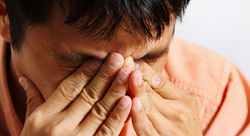
Dry eye is becoming an increasingly problematic issue in modern day Ireland. Here at Stepaside Eyecare in South Dublin I have been encountering more and more people with dry eye issues. In the past I traditionally asked my patients the simple question 'do you have dry eyes?', to which most people relied simply 'No'. In the past few years I have asked more specific questions like 'how do your eyes feel when you're on the computer?', 'do you find your vision blurred on your drive home from work?' or 'do you ever get a stinging sensation in your eyes when the air conditioning or heating is on in the office?'.
I have found that in almost every case I am told about problems that are invariably linked to dry eye. In fact over 15% of people in their 30's are affected by dry eye and this increases with age.
So now that we know how common dry eye is, how do know if we have it and what can be done? Some medications are linked to an increase in dry eye - I will always ask about general health and medication in your eye exam. It is also more common as we get older. If you have had laser or cataract surgery then you may be more likely to have dry eye symptoms. It is also caused by our environment - air con, heating, etc. Using computer screens reduced our blinking rate, therefore allowing the surface of the eye to dry more.
The following symptoms are commonly associated with dry eye - grittiness, foreign body feeling (something in the eye), light sensitivity, inability to wear contact lenses, night time glare, low quality vision for reading and/or watching TV, burning sensation.
A recent survey of people of working age likened the impact of dry eyes as similar to Angina when it come to impact on quality of life.
Before I can dispense advice and options in order to manage and control dry eye syndromes I need to perform a full dry eye assessment. A full vision check is followed by assessment of the eye surface and a thorough inspection on the eye lids and lashes. I can can then assess the quality of the tears in so far as how well they wet the eye and what elements are depleted.
All of this information allows for a discussion and planning on how to ease discomfort and improve the quality of life of the person affected by dry eyes. The most common port of call is the pharmacist for eye drops and while these can help they more often than not simply mask the underlying issue.
If you have any of the symptoms outlined above or if you have been told you have dry eye and were simply given drops then get in contact with us to discuss how we can help.
I have found that in almost every case I am told about problems that are invariably linked to dry eye. In fact over 15% of people in their 30's are affected by dry eye and this increases with age.
So now that we know how common dry eye is, how do know if we have it and what can be done? Some medications are linked to an increase in dry eye - I will always ask about general health and medication in your eye exam. It is also more common as we get older. If you have had laser or cataract surgery then you may be more likely to have dry eye symptoms. It is also caused by our environment - air con, heating, etc. Using computer screens reduced our blinking rate, therefore allowing the surface of the eye to dry more.
The following symptoms are commonly associated with dry eye - grittiness, foreign body feeling (something in the eye), light sensitivity, inability to wear contact lenses, night time glare, low quality vision for reading and/or watching TV, burning sensation.
A recent survey of people of working age likened the impact of dry eyes as similar to Angina when it come to impact on quality of life.
Before I can dispense advice and options in order to manage and control dry eye syndromes I need to perform a full dry eye assessment. A full vision check is followed by assessment of the eye surface and a thorough inspection on the eye lids and lashes. I can can then assess the quality of the tears in so far as how well they wet the eye and what elements are depleted.
All of this information allows for a discussion and planning on how to ease discomfort and improve the quality of life of the person affected by dry eyes. The most common port of call is the pharmacist for eye drops and while these can help they more often than not simply mask the underlying issue.
If you have any of the symptoms outlined above or if you have been told you have dry eye and were simply given drops then get in contact with us to discuss how we can help.

 RSS Feed
RSS Feed
